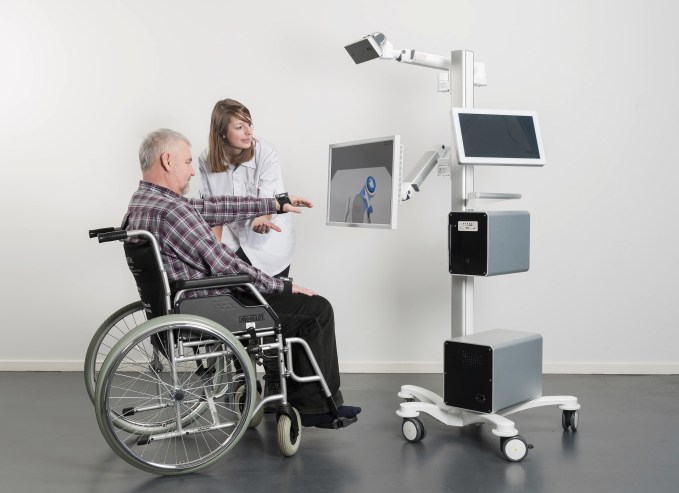As consumers and businesses begin to focus on what form the next generation of computing may take beyond our current era of the smartphone, startups developing at the cutting edge of these concepts are attracting some major attention from investors. MindMaze — which is developing both hardware and a software platform that create “human” virtual reality experiences by tapping into advances in computer vision, neuroscience, AI and haptics — has raised a $100 million round of funding at a pre-money valuation of $1 billion.
The funding comes at the same time that another startup working on a whole new ecosystem around virtual and augmented reality — Magic Leap — has also been raising very large sums of money. (Big money is what you need to raise when you are building new ecosystems, I guess!)
MindMaze’s ambition, says CEO and founder Tej Tadi, is to build not just hardware and software for MindMaze’s own services, but to develop technology that might power VR experiences across a range of other devices and services.
“It a bit like the Intel Inside model,” Tadi explained to me in an interview. “We want all VR to be powered by us. It won’t matter if you have a Magic Leap or another device. Whatever it is, they will want to use our chipset.” This means a lot of patents, too — one area where the funding will be going.
Interestingly, the funding is coming not from Silicon Valley stalwarts but a strategic backer and several family offices. It’s being led by the Hinduja Group, a massive multinational conglomerate that will help not only with product distribution but manufacturing. Hinduja Group was also the lead in MindMaze’s previous — and only other — funding, a $10 million seed round.
“MindMaze’s next-generation human-machine interface is already proving itself in healthcare, games, and its potential for applications in transportation, defense and various types of media are now ready to be truly explored,” said a spokesperson from the Hinduja Group. “We are excited to help MindMaze build on its achievements, while seeing that both current and future partners have their collective visions realized.”
And I should note, that’s not to say that MindMaze is not talking to aforementioned stalwarts. Tadi notes that it’s also already speaking with VCs and strategics in the Valley either to add to this current round or to invest down the line in strategic partnerships that will help MindMaze better grow its business. He would neither confirm nor deny whether Qualcomm or Intel are involved in those conversations.
On top of this, the company also has an impressive list of advisors and board members, including execs from Medtronic, Baxter, HBO, Stanford University, UC San Francisco, The Brown Institute for Brain Science, The Wyss Biotech Center and EPFL.
If you are a VR enthusiast, you may be forgiven for not knowing who MindMaze is. Founded in 2012 out of Lausanne (a hotbed for interesting computer graphics research and startups, as it happens) and led by former academic Tadi, who initially did studies in electronic engineering before expanding to computer graphics, artificial intelligence and neuroscience, the perfect combination for his particular startup, the company has largely been flying under the radar up to now.
But that doesn’t mean it has been devoid of activity or even keeping quiet about what exactly it is working on, which an approach that others like Magic Leap working new tech around VR and AR have been known to take.

MindMaze kick-started its own business by developing products first for enterprise usage, and specifically for the healthcare industry. One application is for helping patients who have suffered brain injuries (eg through strokes or other incidents) retrain their bodies to work again.
What exactly is MindMaze doing? Making a stronger connection between what is happening in a person’s brain, a person’s body, and what is being experienced in the virtual reality scenario, and how the three can work better together.
“There is a strong market need to help patients improve their quality of life,” Tadi says, who adds that this is an area that has seen almost no innovation, in terms of what hospitals on the ground are actually using for patient therapy.
And this is not vaporware. MindMaze has devices — which include both wearables and training software that taps into working on rebooting damaged parts of the brain — already deployed in several top university hospitals across Europe and elsewhere, he says, with several more on order for the second phase of deployments. Part of the funding will be going towards financing for future contracts as well as service centers to work with customers.
The next phase, he says, is to translate this to the consumer experience, which he believes could take the form of gaming, educational and fitness applications.
In the latter, there is a lot of room for growth, he notes, since so many quantified self applications and wearables focus on physical diagnostics but not how a person is doing from a cognitive perspective — and we all know how much of a role mind over matter plays when it comes to physical activity. He says the aim is to launch its first consumer headset later this year in the later part of this year.
The company is also making sure it has its IP in order. Some of the funding will be going towards filling out its patent filings. There are six already filed, Tadi says, with another 10 in the process of getting filed. “Our patent portfolio is going to keep growing,” he said.
Other areas where the funding will go is in hiring. Currently there are 55 people at MindMaze across Europe and San Francisco, with the majority in Lausanne at the moment.































Comment